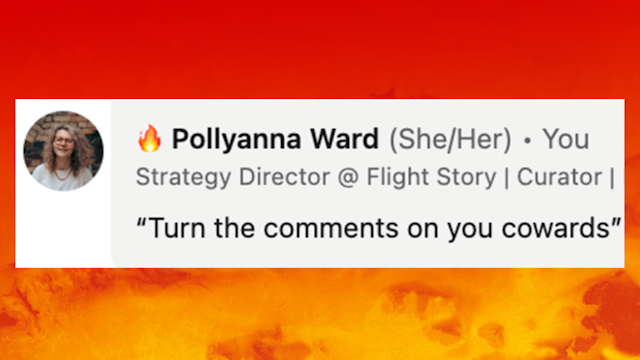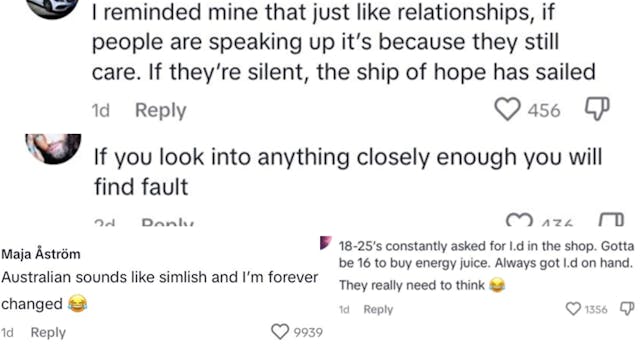'Turn on the comments you cowards': Why are brands blocking feedback on social?
Social is supposed to be a conversational channel, so why are brands turning off the comments? Pollyanna Ward’s got herself wound up with this one.

I recently saw a TikTok ad promoting an exciting new film with all the ingredients of a great social video: characters inviting the user into their world, pacey scene changes, text overlays and an awesome branded effect that would shoot objects across the screen when I hit Like.
This video was also shared to LinkedIn by one of my peers, who was quick to point out that the comments had been turned off. No one engaging with the video could share their opinion, good or bad.
This got me thinking: why go to all that effort just to turn the comments off?!

Now, I don’t really believe that brands that turn the comments off are cowards. I appreciate there are a multitude of understandable reasons why you have them off:
-
Prevents negativity - ‘Nope, we don’t want people to see the comments and be switched off!’
-
Keeps focus on the creativeness of the ad - ‘We spent lots of money on this ad, so we need people to watch that, not read comments!’
-
Saves money - ‘We don’t have to pay someone to monitor and engage with comments!’
-
Exclusivity - ‘we’re only accessible to the few’
However, now that I have your attention, I’d like to share my three reasons why I believe turning the comments on is a good thing for your advertising efforts.
Firstly, it’s an insights goldmine. I’ve talked frequently on LinkedIn about the comments of TikTok being an overlooked place for research. These are people commenting off the cuff, and in response to most videos there’s usually an interesting or unusual insight shared. If you’re trying to find that magic unlock for your next creative brief, it’s an easy win to see what people are saying.
Here are a few from my bank of screenshots, but there will be so many more.

Brands that have used the comments section for creative ideas have seen their content do numbers in response because it’s tapping into something that resonates with their audience. This means your advertising budget works so much harder because you’re able to generate earned attention off the back of it.
Advertisement
Capri-Sun, for example, spotted people commenting that they freeze their pouches and enjoy them as ice lollies in the summer. This organic TikTok video using this insight generated 1m views.
@caprisun Or maybe not? #caprisun #fyp #foryou #winteriscoming #frozencaprisun ♬ original sound - movieclips
E.L.F Cosmetics kept being asked lots of questions about its product ingredients so it set up a series with Dr Dave, the head of R&D, to answer those questions. The series has been going for two years now, racking up millions of views in the process.
@elfyeah POV you just answered a ft from Dr. Dave #stitch #drdave #stickyaself #powergripprimer #powergripniacinamideprimer #stickyprimer #beautyscience #elfcosmetics ♬ original sound - e.l.f. Cosmetics
If you turn off your comments, you might be sleeping on your next big creative idea.
Next, we cannot deny the power of social proof. When I was reading Richard Shotton’s book The Choice Factory, [editor's note: read it] he stated: "Social proof is an influential, but under-used approach".
There is a phenomenon where people like to know that the choice they have made was also made by others. We humans like to be part of a community. We trust things that others have already tested and in many cases, are more likely to be influenced by something when we believe others are receiving the same message.
In GWI’s Gen Z Global Report (2023), of all the reasons to buy a product online, the biggest percentage of Gen Z purchase drivers was ‘lots of likes and comments’ at 24%. According to Sprout Social, ‘Comments or product reviews are the second biggest reason consumers buy on social,’ and TINT found that as a result of a recommendation from someone else, 76% of consumers have bought a product.
I understand that the ‘Likes’ and ‘comments’ debate is a bit of a hot one, so I’ll tread carefully here. I’m not proposing that your KPIs should now be switched to driving engagement. I do subscribe to the law of double jeopardy, whereby the bigger your brand, the greater the loyalty, however. If you can make 1% gains where possible, why wouldn’t you? The compounding effect of lots of little things leads to a result greater than the sum of its parts. Turning the comments on might be insignificant in silo, but altogether as part of your consumer’s journey, wouldn’t you want to make sure you had done everything possible to drive brand and sales?
My final point brings us to the role of channels in our media plans. If we are choosing to enter a social platform, why are you denying people the opportunity to ‘be social’? As marketers, our job is to be customer-obsessed. We bring the customer into the room and make sure everything we do is focused on giving them the best experience possible of our brand - whether that’s toilet paper and bleach or luxury bags and fast cars.
If a customer has a negative experience with your product or service, wouldn’t you want to know about it so that you can put it right? Or if they have a question about how to use it, wouldn’t you want to help them?
Turning off comments is the equivalent of burying your head in the sand. When the going gets tough, we must be comfortable with leaning in.
Hell, some brands even use these pieces of feedback to dig deeper into their positioning; just take a look at RyanAir’s TikTok (although embrace this strategy with caution!).
Brands spend thousands every year on consumer surveys, market research papers and focus groups. The comments section doesn’t replace any of these, yet when it’s lying there on TikTok, free and full of shower thoughts, it’s crazy that there would even be an option to turn them off.
So, can we turn off the requests to turn comments off instead?
Can we get comfortable with embracing what our customers really think about us? Because your next product innovation or campaign idea could be lying dormant in the minds of one of your most vocal customers.

